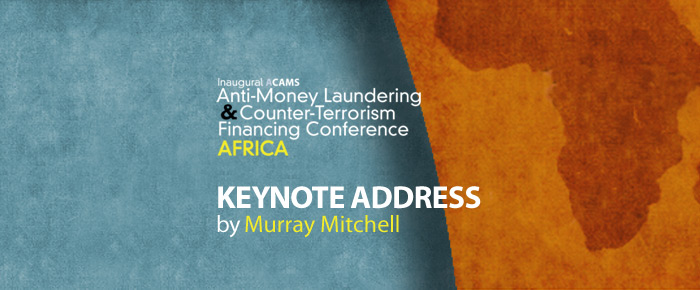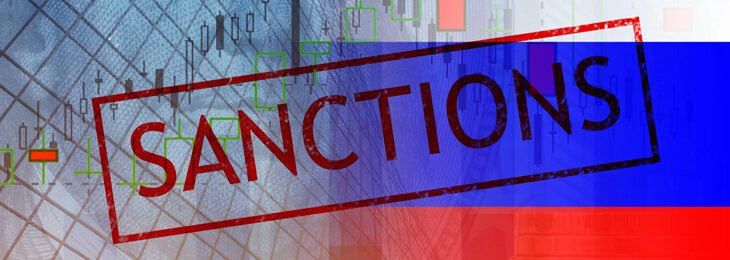
Special keynote address by Murray Michell, director of the Financial Intelligence Centre in South Africa at the Inaugural ACAMS Anti-Money Laundering and Counter Terrorism Financing Africa Conference in Johannesburg on November 3, 2011.
Chairperson
John Byrne, and friends from ACAMS international
Roy Melnick, and members of the ACMS South Africa Board
Guests, and especially those of you who have travelled from various parts of our great continent to be here. Thank you very much for inviting me to be with you this morning.
Before anything else I wish to congratulate the ACAMS South Africa Board for the effort you have put into establishing ACAMS in our country. It makes all of us very proud to be associated with you. I am not going to talk about the technical issues of AML/CFT this morning. That is your area of expertise and is the purpose of your interactions over the next two days.
I want to sketch something of an overview and give you a sense of why I believe the matter of compliance, and especially that of AML/CFT compliance, is increasingly important. It is also why I believe ACAMS has such an important role to play in South Africa and across our continent. Perhaps we should start by asking ourselves why are gathered we here today and tomorrow, focused on AML/CFT compliance and crimes involving finance, as a grouping of professionals?
The obvious answer is that there is an armoury of rules and regulations that we—the compliance professionals—are expected to monitor and to apply in our work environments. Whether we work in compliance monitoring or investigating breaches of compliance, we all have a common foundation from which we are operating. In essence these are the AML/CFT standards developed by the FATF and applied within each of our jurisdictions.
But we also take on the compliance burden because, perhaps in even a selfish way, compliance has everything to do with us—it is about protecting our financial institutions from being abused by criminals and to prevent them from getting access to the hard-earned investments the institutions look after. In looking after our investments these businesses help to grow the economy and thereby ensure a positive future for us and all citizens in our country.
But we are also meeting at a particular moment in history. So we need to take a step back from the day-to-day fray and get a bit of perspective.
As we meet here, the Ministers of Finance of the G20 are meeting in France, faced with quelling a financial system rapidly imploding. Their challenge is a crisis brought about by many things, but central to which I believe, is an accumulation of disparities and inequalities. These disparities exist between countries, and within countries between individuals. We in South Africa live this as a daily reality and it is something we cannot be proud of.
I have already suggested that we might assume that by gathering here today we have a common perspective, one which involves us in trying to ensure the integrity of financial institutions and the financial architecture as a whole system. But hovering around us, known but unknown, is also the shadow financial system. It is part of that system, but we seldom recognise it as such. It is the system made up of banking secrecy, tax havens, fake and front companies, trade mispricing, tax evasion and money laundering. It is finally being recognised as one of the most important drivers of economic disparity. This is a system that has always existed, but has been spurred in recent decades by the fall of colonialism, and then more recently through a consolidated globalised and unipolar world.
This shadow financial system should hardly be called that, because it is, simply, huge. A recently released research project by the UNODC put it at US $1.3 trillion per annum. That’s an awful lot of non-compliant money circulating!! What of that do we, as compliance people, see? Do we even recognise most of this as proceeds of crime? By the reckoning of many experts, we might see 1 percent. That’s an incredibly small number—1 percent of 1.3 trillion? If that is true, then it tells us a lot. I suspect it tells us that we don’t know how to really see that which we already know. It is a form of denial. And what does that say about us, the professionals in this business?
By definition this shadow system operates outside of state controls. These illicit funds are deliberately hidden. Governments cannot count them, so proper planning and budgeting is difficult. They cannot be reached by the tax authorities. Just think of the massive, positive impact these funds could have on trade, economic growth and development in all countries. Think how they could transform the prospects in developing countries.
The same opacity and lack of transparency that facilitates this system is also partly responsible for the budget crises that are plaguing governments in developed countries.
So in the face of this shadow financial system what is the responsible thing to do? Here I speak as a regulator. Most of us are aware of the G20 battling to contain the contagion sweeping the world’s financial systems. What is less obvious is the intense work going on behind the scenes to rethink and re-shape the international financial architecture. There is a strong view that the key to curtailing the shadow economy and shoring up the institutions in the architecture is a mixture of heightened control measures and greater transparency. There are several processes or threads of discussion being pulled together and which will shape our compliance world in years to come.
What are some of these themes?
I think the most important of these is the emphasis on increased transparency, and particularly, financial transparency. There are many sides to this. How to get governments, large companies and certain categories of people (for example, our favourite, the PEPS) to properly and fully disclose their financial affairs? Governments are under pressure to publish budget documentation and to disclose their national accounts, including receipts, assets and liabilities. (Last year South Africa was voted as having the most transparent budget documentation system in the world - a matter of great pride). In essence, this is about increasing the flow of information between corporations, governments, and citizens in all countries, so that all may be empowered to take informed decisions. We have only to watch what happened in Tunisia, Egypt and Libya (and of course is still happening) to realise that transparency is also about reducing corruption. If countries and their citizens are to be successful in repatriating assets stolen by dictators and corrupt politicians, then the more transparency, the easier that will be.
A second angle to increased transparency is to require multinational companies to report fully on their operations, wherever these may be around the globe. Already the EU has recently issued a directive on Country-by-Country financial reporting obligation on multinationals. Reporting of royalty payments, bonuses, and taxes a large company makes to a government will reveal the impact that company has on the host country. It will also help reduce trade mispricing, where profits made in one jurisdiction are shifted around and end up where taxes are lowest and where secrecy and opacity is greatest. Mispricing is a common mechanism to do this - and estimates put trade mispricing at 54 percent of illicit flows from developing countries!
Currently reporting requirements for financial accounting for multinational corporations allows them to consolidate the results for all their country operations in a single report. What Country-by-Country reporting will enable is for companies to be completely transparent about sales, profits and taxes in every jurisdiction where they are located.
A third, linked area of increased transparency is focused on the so-called extractive industries and now includes forestry and logging. Unfortunately, these industries have a terrible reputation for extracting not only gas, oil and minerals from developing countries, but also massive profits, often contribute minimally to the tax base of the countries within which they operate, and frequently stand accused of facilitating corruption and the flow of illicit funds. In July the US introduced provisions in the Dodd–Frank Act, which makes it a requirement that any companies listed on the New York Stock Exchange report all payments to governments where they function. The EU has also released a directive for European companies, and at the end of last week the Australian authorities announced that they too had decided to throw their lot behind these initiatives in the extractive industries.
The emphasis on increased transparency: through country-by-country reporting and a focus on the extractive industries will make a huge difference in many parts of our continent.
They bring other benefits too. They imply greater disclosure of tax-related information. Current international tax information exchanges between governments require a high level of certainty regarding tax evasion before information can be provided by the requested state. So providing tax information through an automatic exchange system will allow a more efficient collection of tax data and improved revenue collection.
There is a big push for all countries to enforce legislation to know who owns what accounts in financial institutions. Who are the beneficial owners of accounts? To whom do the legs and arms and eyes belong? This information is critical to enable national authorities to easily track the activities and accounts of PEPS, corrupt officials and members of large crime syndicates.
All of these things are being considered and translated into the FATF Recommendations for Anti-Money Laundering and for Combating the Financing of Terrorism. These standards need to be up-to-date and relevant. But Advocate Smit will speak to you more about the review process taking place within the FATF.
I also want to make a different but I think important point about who is involved in these processes to introduce increased levels of transparency. The nature of and the extent of the problems, touching on all the worlds 7 billion citizens, are no longer being tackled only through government-to-government interactions. The current crisis confirms another trend, which is a combination of governments, the private sector, large NGOs and citizens involved and engaged on the issues. Often it is on single ticket issues. Much of the struggle for increased financial transparency comes out of the engagements between these sectors—and all stand to benefit.
Why do I raise all of these issues—seemingly so far removed from our everyday experience?
Because we in the compliance environment will have to deal with the results of the debates being held and decisions that are now being made. There will be changes, and these changes will make our lives tougher. So in my view it is better that we understand what is happening and why, and that we intervene proactively so that we are already prepared when those changes come our way.
The new standards of increased transparency and accountability will require that our financial institutions respond accordingly. They will do so if they have a perspective of responsible business.
So how do we see this from the South African perspective? The Financial Intelligence Centre is our country’s national centre for monitoring the proceeds of crime and combating money laundering and the financing of terrorism. Around 2005 the FIC became fully functional and the AML/CFT system as a whole started moving. Since then, the FIC has had a four-pronged approach to ensure that our legislation keeps abreast of the international standards and responds dynamically to the changing environment; that our financial intelligence products are proven useful to our various clients; that we roll out our compliance framework, thus ensuring that more and more businesses are playing by the rules; and that the FIC becomes an effective and efficient organ of state. We believe we have reached a point where those building blocks are in place. We think we are on the cusp of entering a new phase in our history.
In the last financial year we received 36 990 Suspicious Transaction Reports. These might seem insignificant numbers in an economy the size of ours. But increasingly they represent growing levels of compliance, as more and more businesses beyond the banking sector report STRs. And the quality of the information is improving all the time, becoming richer and more valuable.
In December 2010, cash threshold reporting obligations were introduced in South Africa. These require all businesses defined by the FIC Act (accountable and reporting institutions) to report cash transactions to the value of R25 000 and above. Since then we have received nearly 4,5 million CTRs amounting to a value of R106 billion. These two streams - STRs and CTRs – together with other data we now have access to, have already proven invaluable in being able to generate significant financial intelligence and products for use in investigations and in policy development.
Coupled with financial intelligence products, we now also provide active support in criminal investigations by the authorities – often through a task-team approach. So the information you send us is increasingly being used directly, sometimes dramatically so, in law enforcement operations. Mr Nischal Mewallal will talk to you later in the programme about this.
It is in the compliance area where some of the biggest changes have come. While the changes pose serious challenges to the range of supervisors – the Banking supervisor, National Gambling Board, Estate Agency Affairs Board, Financial Services Board—they have considerably tightened compliance requirements for businesses. The various supervisors, including the FIC, have been conferred the powers of inspection and the ability to impose administrative sanctions for non-compliance to the FIC Act. These are powerful tools that enable our thrust for improved levels of compliance.
Our approach is one of visible enforcement. Non-compliance will carry with it the threat of serious sanctions, as well as the threat of some serious reputational damage. I am sure that Mr Christopher Malan and other colleagues from the FIC will be able to give you more details on this in their presentations. But rest assured that the AML/CFT compliance framework is set for a significant change in the months ahead.
We have discovered that it is not a simple matter to roll out a new regulatory framework, let alone one as contentious as that of AML/CFT. There are deep and enduring challenges, not least of which is human capacity. It is a simple fact that there are not enough trained or knowledgeable people to cover the field – neither within the supervisors and nor within the reporting entities. This is of concern to us and we are considering various ways of doing this.
This conference and the role offered by ACAMS are important if we are to raise our understanding and our capability in AML/CFT. It provides a platform for people with a common set of objectives to co-operate, share information and develop their skills.
It is a truism to say that crime easily scales geographical barriers, and so too does the flow of illicit money. If we know so little of what is circulating as proceeds of crime, then it tells us the scale of the task ahead of us. A robust compliance environment will be pivotal in order to “up” that percentage of 1 percent.
This is why I believe that if we want to make a difference—by reducing crime, by developing our societies, to our lives and that of future generations – then the area of AML/CFT is at the heart of this.
Your conference comes at an important time. You gather together the best in the profession, and you do so as big changes and challenges loom on the horizon. It shows too that ACAMS has come of age here.
I wish you well in your discussions today and tomorrow. Thank you very much.
Murray Michell
Director, Financial Intelligence Centre










